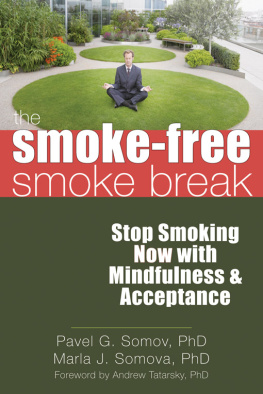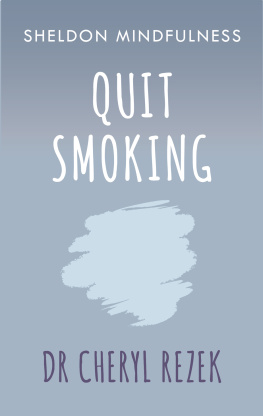Pavel G. Somov, PhD, is a licensed psychologist in private practice in Pittsburgh, PA. He is author of Eating the Moment, Present Perfect, and The Lotus Effect. Visit his website at www.eatingthemoment.com.
Marla J. Somova, PhD, is a licensed psychologist in private practice and a faculty member in the department of psychology and counseling at Carlow University in Pittsburgh, PA. Somova received specialized training in smoking cessation treatment methods and has led multiple smoking cessation groups in hospital and community settings.
Foreword writer Andrew Tatarsky, PhD, has specialized in the field of substance use treatment for over thirty years as a psychologist, supervisor, program director, lecturer, and author. He is director of the Center for Integrative Psychotherapy for Substance Misuse, a treatment and training institute, and is author of Harm Reduction Psychotherapy.

Publishers Note
This publication is designed to provide accurate and authoritative information in regard to the subject matter covered. It is sold with the understanding that the publisher is not engaged in rendering psychological, financial, legal, or other professional services. If expert assistance or counseling is needed, the services of a competent professional should be sought.
Distributed in Canada by Raincoast Books
Copyright 2011 by Pavel G. Somov and Marla J. Somova
New Harbinger Publications, Inc.
5674 Shattuck Avenue
Oakland, CA 94609
www.newharbinger.com
Cover design by Amy Shoup; Text design by Michele Waters-Kermes; Acquired by Melissa Kirk; Edited by Nelda Street
All Rights Reserved
Epub ISBN: 9781608826261
The Library of Congress has Cataloged the Print Edition as:
Somov, Pavel G.
The smoke-free smoke break : stop smoking now with mindfulness and acceptance / Pavel G. Somov and Marla J. Somova ; foreword by Andrew Tatarsky.
p. cm.
Includes bibliographical references.
ISBN 978-1-60882-001-6 (pbk.) -- ISBN 978-1-60882-002-3 (pdf e-book)
1. Smoking cessation. 2. Mindfulness-based cognitive therapy. 3. Smoking--Psychological aspects. I. Somova, Marla J. II. Title.
HV5740.S65 2011
616.86506--dc23
2011027864
Contents
Foreword
Welcome to Pavel Somov and Marla Somovas guide to changing your relationship to smoking, whether that means quitting, cutting back, or simply smoking more mindfully. This groundbreaking book is both a state-of-the-art, research-supported, practical manual for breaking the habit and a compassionate guide to waking up and becoming fully present in your life. I am deeply grateful for the gift of this book, and I am certain that you will feel the same as you work and play your way through it.
From the first page, I was riveted. Having worked professionally with addictive behavior for thirty years, I am seldom surprised by new ideas. Yet this book surprised me with many delightful, inspiring, and useful ideas and exercises that I immediately began to bring into my work with patients.
This book rides the crest of a new, hopeful, and effective approach to positive behavior change thats revolutionizing the way professionals understand and address addictive behaviors. We are emerging from a dark, pessimistic age in which addictive behaviors, such as smoking, were viewed as permanent, chronic diseases that only complete and total abstinence could heal. Therein, addicts were stigmatized as powerless and controlled by their disease. The prognosis was poor because these people were seen as merely responding to negative social sanctions and requiring coercive treatments that, unfortunately, failed the overwhelming majority. This failure was attributed to the disease and the addicts lack of motivationa bleak picture indeed!
While this scenario is more frequently associated with the harder addictions, it is also applied in more subtle ways to the smoking addict, reflected in the current embrace of increasingly punitive, unsympathetic social attitudes and actions toward smokers, such as increasing taxes on cigarettes to an extent way out of proportion with other recreational activities. I and others have critiqued the biologically reductionistic view that blames the evil drug or the addicts moral weakness while missing the complexity of the smokers relationship to smoking. Inadequate understanding of the behavior and the resulting inadequate treatments explain the poor outcomes of treatment and self-help approaches. This book explores this stigmatization of smokers in greater depth and discusses why smokers warrant compassion, acceptance, and respect, which are essential for developing a healthier relationship to smoking.
The emerging paradigm offers a more complex and positive understanding of why people develop addictive behaviors, and it suggests more effective approaches to changing them. This increasingly accepted approach understands addictive behaviors as being related to a complex interplay of biology, psychology, and social context that is unique for each person. Addictive behaviors reflect a variety of positive, adaptive motives that need to be recognized and appreciated before work on behavior change can be successful, motives that include the need to cope with stress and other difficult feelings and life circumstances, to care for oneself, and to seek pleasure and enjoyment and the related social experiences. Addictive behaviors always have positive aspects that attract people to them. People smoke and use other substances because it feels good and works in some vital ways, even when the behavior may have serious short- and long-term associated risks. This view sees smokers and other drug users as people who are responsible for their choices, and it approaches the question of why people make these choices with compassion, empathy, and respect. This adaptive viewpoint explains why people begin smoking and find it pleasurable, and it also provides a way to consider what issues may need to be addressed to support a choice to stop or reduce smoking. Our understanding of behavioral conditioning provides a model for understanding how, ever so subtly over time, the initial choice to smoke can become a deeply ingrained, irresistible overlearned habit that is very difficult to changein the authors words, from mindful choice to mindless habit. This understanding of addictive behaviors suggests that an effective approach to changing them requires both recognizing the positive functions of the behavior and employing a strategic approach to change these deeply ingrained habits. This book offers the solution: meet the mindlessness of habit with a mindful awareness that enables the smoker to confront powerful urges with an alternative solution or response that reinforces a new pathway.
This book beautifully brings these ideas to life in a way that is clear, compelling, and inspiring. The authors teach a comprehensive mindfulness-based craving-control technique for awakening the smoking zombie and turning mindless habitual smoking into mindful smoking, a process that literally extinguishes the smoking habit. Not only will you learn how to break the habit step by step, butand this is the real payoffyou will also be introduced to mindfulness practice in the process! The authors will show you how to actually use your smoking urges as reminders to meditate and cultivate a greater capacity to be more fully present to yourself and your life. Their technique brings together mindfulness practice and relaxing breathing through many creative exercises and provocative koans designed to teach and provoke, encourage and seduce awakening. Like wise old Zen teachers, the authors are sometimes gentle and loving, and sometimes funny and perplexing, and they always invite deep introspection, recasting the hard work of quitting smoking as an exciting adventure of self-discovery.














